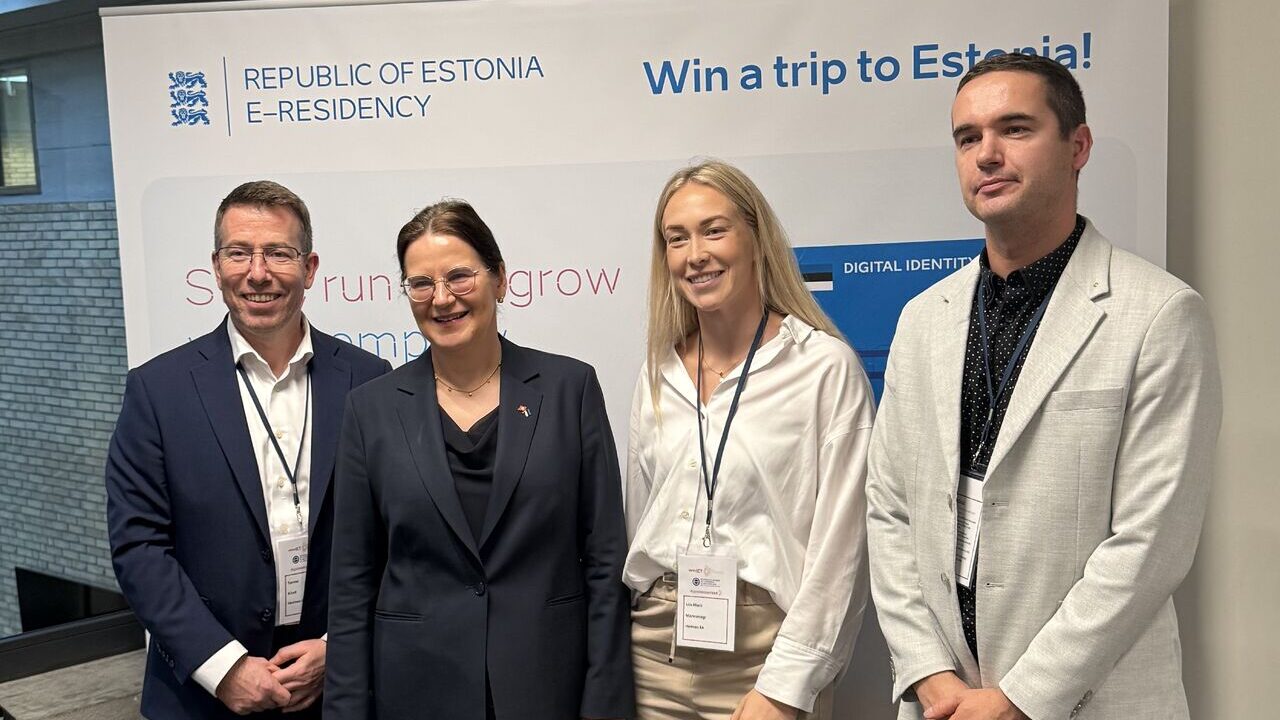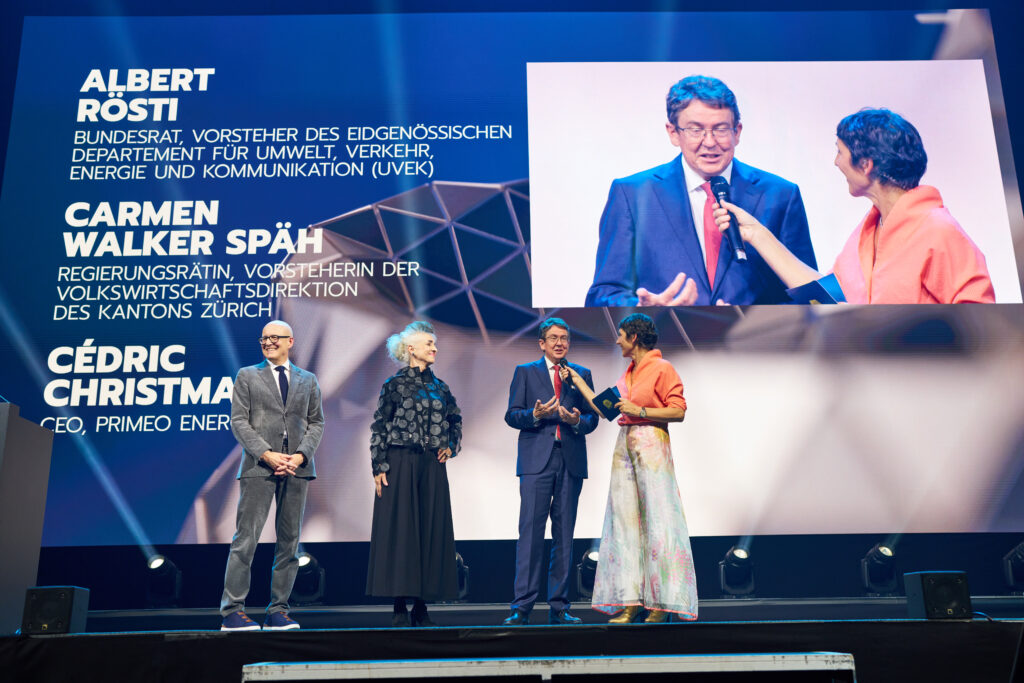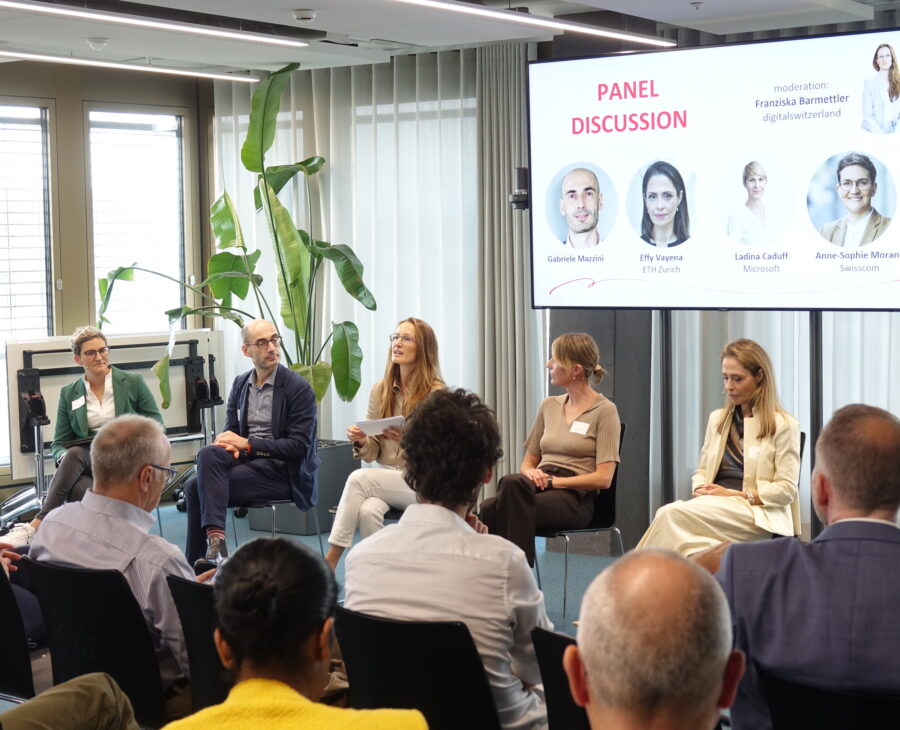On 13 November 2025, the Hallenstadion in Zurich became the centre of digital Switzerland. From international inspiration to security policy debates and innovation awards, the day offered a packed programme that showed how complex and closely interlinked the digital transformation has become. While Estonia and Switzerland discussed digital resilience in the afternoon, the Cybersecurity Committee meeting of digitalswitzerland took place at the same time. Finally, the evening was dedicated to the Digital Economy Award 2025, which honoured the best projects and personalities from the Swiss ICT industry.
Estonia as a mirror and as a source of inspiration
The event kicked off with the Estonian Chamber of Commerce in Switzerland, organised by swissICT and digitalswitzerland. The focus was on Estonia, the country that has become synonymous in Europe with modern digital administration and consistent cyber security.
Estonian Minister of Justice and Digital Affairs Liisa-Ly Pakosta showed how her country designs digital services to remain reliable, secure and understandable for the population. Estonia combines digital identity, automated administrative processes and cyber security into an integrated system that is trusted by the entire population.

This input is particularly valuable for the Swiss representatives. Since the successful e-ID decision, the focus has now shifted to concrete implementation: how the state-run identity system will be structured, introduced and further developed in detail. The discussions made it clear that Estonia and Switzerland are building on similar principles in terms of trust, transparency and the aspiration to understand digital administration as a service to the population.
Cybersecurity as a prerequisite
One room further along in the conference rooms of the Hallenstadion, the Cybersecurity Committee of digitalswitzerland met. Tommaso Bernabò from the European Commission made an important European contribution by explaining the Cyber Resilience Act. The regulation sets out new requirements for secure digital products and will be implemented gradually by 2027. Questions from the plenary session on reporting channels, supply chains and market surveillance showed how relevant the debate is for Swiss companies.
In the subsequent panel discussion with Doris Pöld, Ralf Schneider and Florian Schütz, the focus was on cooperation and information exchange. The experts made it clear that successful cyber security is not based solely on technical defences. It requires joint team exercises, open communication about attacks and sectoral cyber security centres that also connect government and private actors.
It also became clear that the boundaries between military defence, private defence and government responsibility must become more permeable if Switzerland is to remain resilient.
Annual event for the Swiss ICT industry
In the evening, the serious political mood gave way to festive energy as the Swiss ICT industry gathered for the Digital Economy Award 2025. More than 800 guests from the ICT industry, politics, administration and science came together to celebrate the most important digital projects and personalities of the year.
Between the award presentations in the various categories, Federal Councillor Albert Rösti also gave a speech and set a political anchor: Rösti reminded the audience that Switzerland’s digital future can only succeed if the population has confidence in digital systems. Rösti emphasised that Switzerland must shape this transformation in such a way that it creates trust, protects fundamental rights and promotes innovation. The Federal Council does not want to regulate too heavily, Rösti said several times.

The award-winning projects showcased the technologies that Switzerland has to offer in practice. AI plays a central role in this, for example in the intelligent building control system from ISS Switzerland with Akenza, in the AI sandbox of the Canton of Zurich and in the robotics solutions from mimic robotics.
Emotional highlights included the NextGen Hero category, in which young talents from the world of science impressed with their clear and bold ideas. Education also played a decisive role: Bühler AG was named the overall winner in the ICT Education and Training category.
The jury honoured Alina Matyukhina as IT Personality of the Year. She is responsible for global cyber security in the Building Products division at Siemens Smart Infrastructure, demonstrating the expertise that is anchored in Switzerland. The evening was hosted by Monika Schärer and Stephan Lendi, who attempted to strike a balance between entertainment and depth of content.
Strong together
The events showed that digital Switzerland no longer consists of individual projects, isolated technologies or sectoral perspectives. Instead, it became clear how closely international cooperation, cyber security, governance and innovation are intertwined.
Discussions with Estonia highlighted how digital administration and digital identity can be developed in an international comparison and why trustworthy state structures are a key prerequisite for digital services.
The Cybersecurity Committee meeting showed what political, economic and regulatory decisions are necessary to keep Switzerland safe in an increasingly complex threat environment. It became clear that resilience can only be achieved through cooperation, with government agencies, industry and research working together consistently.
The Digital Economy Award, in turn, celebrated those projects and individuals who are making this future a reality in applicable use cases. They are developing solutions that relieve the burden on people and businesses, modernise processes and keep Switzerland technologically connected. This is also to maintain its leading position in digital competitiveness in the coming years.
digitalswitzerland would like to thank swissICT, the Estonian Chamber of Commerce in Switzerland, all partners, guests and contributors, as well as the numerous experts who made this day so memorable.






